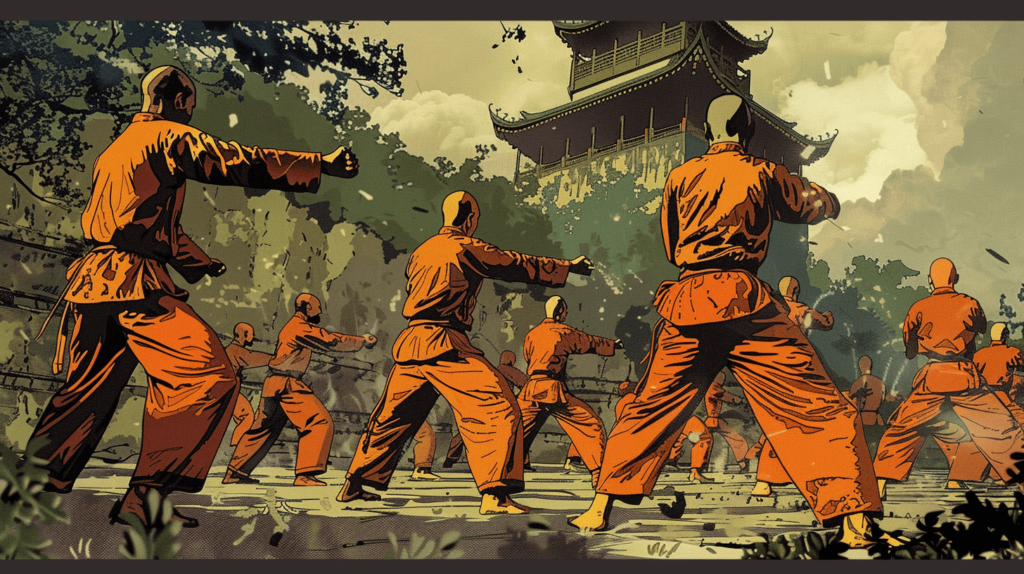
Unveiling the Mystique of Kung Fu
“Kung Fu,” a term originating from China in the realm of martial arts, stirs significant fascination and intrigue. It surpasses its classification as simply a combat technique to encapsulate an intense philosophy centered on self-mastery, discipline, and spiritual enlightenment. This comprehensive exploration plunges into the intricate fabric of Chinese culture to decode the manifold meanings of Kung Fu meticulously; it traces this concept’s linguistic origins, charts its historical evolution—shedding light continually on its enduring significance in shaping not only martial arts ethos but also other aspects far beyond them.
The Linguistic Roots of Kung Fu: Understanding the Characters
The term “Kung Fu” (功夫), at its most basic level, embodies two Chinese characters: “gong” (功) and “fu” (夫). The character “gong” suggests skill, accomplishment or merit; whereas the word ‘fu’ implies time, exertion – even devotion. In unison – these characters embody the core concept of Kung Fu as a rigorous discipline that demands constant application of effort and nurtures expertise through temporal progression. Kung Fu, beyond its literal translation, encapsulates a holistic strategy for self-enhancement: it addresses not only the physical dimension but also mental and spiritual facets.
Historical Origins: Tracing the Legacy of Kung Fu
One can trace the origins of Kung Fu back to ancient China. It emerged as a comprehensive discipline encompassing self-defense, combat training and spiritual cultivation. The legendary Shaolin Monastery historically associates with it along with the teachings of Bodhidharma; furthermore, Kung Fu evolved through synthesizing indigenous Chinese martial arts – Indian Buddhist philosophy also played an influential role in its development– and Taoist principles that emphasize balance and harmony. Across centuries within China’s borders, Kung Fu proliferated across various styles: schools; lineages–each boasting their unique techniques forms philosophies alike.
The Philosophy of Kung Fu: Balancing Body, Mind, and Spirit
The philosophy of Kung Fu places a central belief in the interconnectedness of body, mind and spirit. It draws its roots from ancient wisdom traditions like Taoism and Confucianism; consequently, virtues such as discipline–humility even–resilience take prominence. Practitioners rigorously train to transcend ego limitations: they aspire towards achieving an inner state characterized by balance—nay, harmony is their ultimate goal. Kung Fu: beyond merely its practical applications in combat, it serves as a pathway – indeed, an avenue – towards self-discovery; self-mastery and ultimately enlightenment.
The Practice of Kung Fu: Honing Skills Through Discipline
At its core, Kung Fu demands unwavering dedication, patience, and perseverance as a disciplined practice. The training encompasses an extensive array of activities: forms (kata); drills; sparring–all mixed with conditioning exercises. Practitioners refine their techniques through repetitive practice and mindful observation while also developing physical strength and agility; mental focus – clarity even – is cultivated in this process too. Kung Fu training, beyond its physical aspects, instills qualities: respect; integrity; and humility – thus fostering a profound sense of personal growth and transformation.
The Cultural Impact of Kung Fu: Influence Beyond Martial Arts
Kung Fu, beyond its significance in the realm of martial arts – permeates Chinese culture and society with an indelible mark; it serves as a symbol for Chinese identity, resilience, and cultural heritage. Literature: folklore–theater fictionally or cinematically portrays this enduring connection to Kung Fu. Figures like Wong Fei-hung, Bruce Lee and Jet Li—icons of our time—have not only elevated but globalised Kung Fu; they’ve inspired generations worldwide–infusing passion into enthusiasts’ hearts while guiding their steps on the path towards mastery. Diverse fields like business, education, and personal development apply the principles of Kung Fu – discipline; perseverance; adaptability.
Modern Perspectives: Adapting Kung Fu for Contemporary Times
The digital age propels the evolution and adaptation of Kung Fu to modern society’s demands. Traditional schools and lineages, committed to preserving ancient techniques and philosophies, stand unyielding; however, contemporary practitioners venture into innovative approaches for Kung Fu training. They integrate elements of sports science, technology— even cross-disciplinary collaboration. Furthermore: mindfulness— resilience–these are emphases within Kung Fu that deeply resonate with individuals amidst an escalatingly chaotic world; indeed—they seek balance and meaning in its wake.
Conclusion: Embracing the Spirit of Kung Fu
Concluding, Kung Fu indeed transcends its mere literal definition as a martial art: it encapsulates an ageless philosophy of self-cultivation–resilience and enlightenment. Journeying through the dense tapestry of Chinese culture unveils to us profound wisdom; furthermore, we come face-to-face with Kung Fu’s enduring legacy – a heritage that still inspires individuals today on their quest for personal growth and transformation. By embracing the spirit of Kung Fu–we not only tap into our potential but unlock it entirely; this is how one achieves mastery–harmony–and fulfillment in all facets of life.